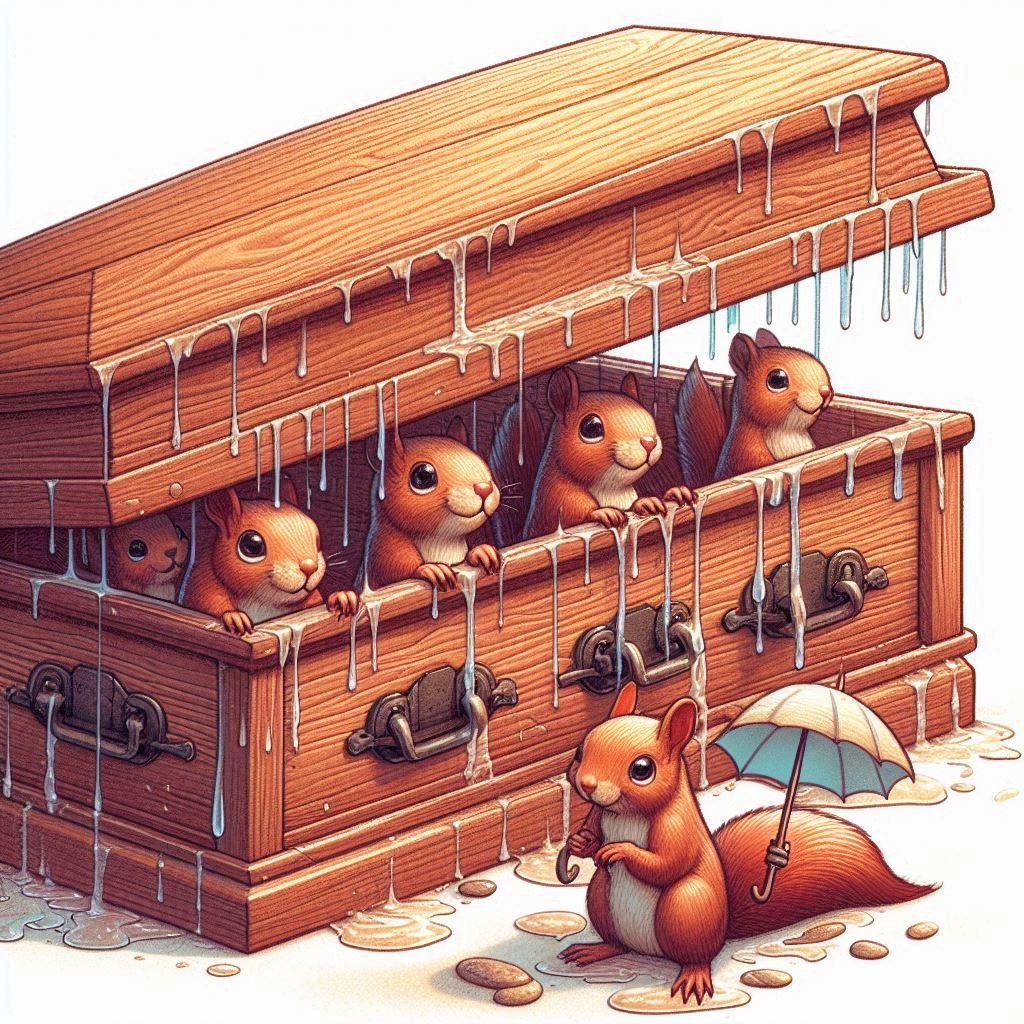Why a coffin shouldn’t leak or squeak?

Why a coffin shouldn’t leak or squeak, AI-generated image for a leaking coffin – Try your at Free AI Image Generator – Image Creator in Bing
A coffin should neither leak nor squeak for several important reasons, all of which relate to the dignity, practicality, and safety of the deceased, as well as the comfort and peace of mind of the family members involved. Here’s why:
1. Dignity and Respect
A funeral is a deeply emotional and respectful event. The coffin represents the final resting place for the deceased, and any flaws such as leaking or squeaking could be perceived as disrespectful or undignified. The family and loved ones expect the coffin to reflect the seriousness of the occasion and to be free from any issues that could detract from the solemnity of the moment.
- Leaking: This can suggest a lack of quality and care in the construction of the coffin. Coffins are meant to be sealed tightly to provide a sense of finality and dignity. If a coffin leaks—whether due to rain or environmental conditions—it can create a deeply unpleasant and troubling experience for the family and attendees.
- Squeaking: A squeak, especially during the service or while being carried, can be jarring and distracting, which is the last thing anyone wants during such a sensitive time. The sound of a squeaky coffin is often associated with poor craftsmanship or inadequate construction, undermining the trust people have placed in the coffin provider.
2. Water Protection and Preservation
Water-tightness is essential for the preservation of the deceased’s body. While coffins are not meant to completely preserve the body indefinitely, they are designed to help contain bodily fluids and protect against external elements like water or moisture.
- Leaking Coffins: If a coffin is not sealed properly or is made from materials that are prone to leakage (like certain woods or poorly treated metals), it may allow moisture or groundwater to seep in over time. This can accelerate decomposition and create an unpleasant environment, which is especially problematic in the case of open-casket services or when the coffin is to be buried in wet conditions.
3. Structural Integrity
A well-made coffin should have sufficient structural integrity to support its weight, provide safety during transport, and maintain its form during burial. Leaks or squeaks could be indicative of poor craftsmanship or faulty materials, which can compromise the coffin’s ability to hold up under these conditions.
- Leaking: This might suggest that the seal (often done with gaskets or other sealing mechanisms) isn’t functioning correctly, which could also affect the strength and durability of the coffin. Over time, a leaking coffin could also affect the overall stability of the grave if the surrounding environment gets contaminated by the leaking contents.
- Squeaking: A squeak can point to weak joints, poorly fitted parts, or low-quality materials, all of which can affect the structural integrity of the coffin, especially if it is being moved during a service. A well-made coffin should not make noise unless it is handled in a rough or improper way.
4. Peace of Mind for the Family
The family and friends of the deceased are already dealing with emotional stress and loss. The last thing they need is to worry about the coffin leaking, making noise, or appearing to be of substandard quality. A high-quality coffin ensures that the loved ones can focus on honoring the deceased rather than being concerned with a malfunctioning product.
- Leaking Coffins: If a coffin were to leak (whether in transit or during burial), this would cause unnecessary distress, which is especially troubling at a time when emotional well-being is fragile.
- Squeaking Coffins: Similarly, a coffin that squeaks while being carried or lowered into the ground would distract from the dignity of the occasion and potentially cause emotional discomfort for family members already going through a very difficult time.
5. Regulatory and Safety Considerations
In some regions, there may be regulations about the quality and safety standards of funeral products, including coffins. If a coffin were to leak or squeak, it could potentially be seen as not meeting those standards, depending on local laws and regulations regarding materials used and product safety.
Conclusion
A coffin should not leak or squeak because these issues compromise the dignity, respect, and emotional safety that people expect from such a meaningful product. A high-quality, properly constructed coffin ensures a smooth, respectful, and trouble-free experience during a very sensitive time. It reflects well on the manufacturer, and more importantly, provides peace of mind to the family, knowing they are honouring their loved one with the care and respect they deserve.
Recommended Posts

Online coffin shopping, is that the future ?
February 13, 2025

Oak Coffins: Unveiling the Differences Between Solid Wood and Veneer
February 12, 2025

